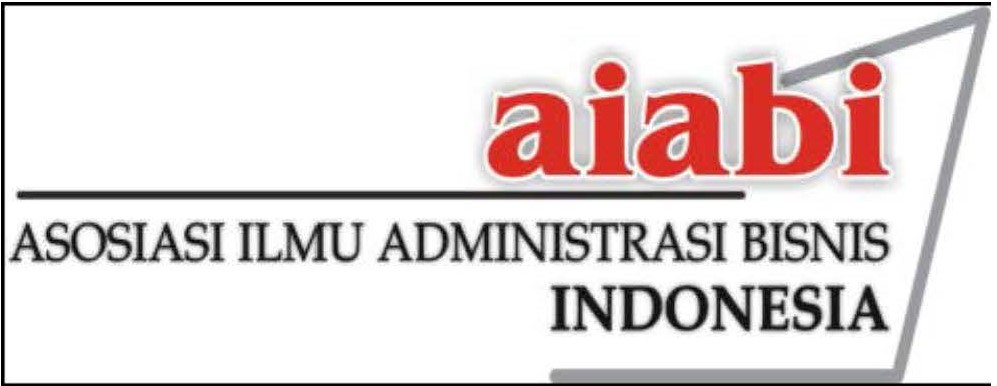CO-BRANDING ONLINE FOOD DELIVERY: PERUBAHAN MODEL BISNIS WISATA KULINER LOKAL KHAS YOGYAKARTA
Abstrak
The aim of this research is examining the implementation of co-branding by the food delivery service and its influence on the local culinary tourism business model of Yogyakarta. This research uses qualitative research with an exploratory study. Data collection was conducted through semi-structured interviews with 13 owners of Yogyakarta’s local culinary. The results showed that co-branding was carried out jointly with GoFoodPartner, but if it was not incorporated into GoFoodPartner co-branding was carried out directly between GoFood and the culinary business management. As for GrabFood, co-branding is done partially to businesses that are not part of their official cooperation partners. The culinary tourism business model has been changing by online food delivery service providers. The change is they have not only done business to consumer (B2C) but then also develop its business model into Business to Business (B2B) and Business to Business to Consumer (B2B2C). It changes the business model of culinary tourism developed into a food tourism business model.
Penelitian ini mengkaji tentang implementasi co-branding oleh layanan food delivery tersebut dan pengaruhnya pada model bisnis wisata kuliner lokal khas Yogyakarta. Penelitian ini menggunakan jenis penelitian kualitatif dengan metode eksploratory. Pengumpulan data dilakukan melalui wawancara semi-terstruktur dengan 13 pelaku usaha wisata kuliner lokal khas Yogyakarta didukung observasi serta dokumentasi. Hasil penelitian menunjukan bahwa co-branding dilakukan secara bersama-sama antara GoFood dan pelaku usaha wisata kuliner yang tergabung dalam GoFoodPartner, akan tetapi jika tidak tergabung dengan GoFoodPartner co-branding dilakukan secara terpisah antara GoFood dan pelaku usaha wisata kuliner. Sementara untuk GrabFood juga demikian, co-branding dilakukan secara partial untuk pelaku usaha wisata yang bukan masuk dalam mitra kerjasamanya. Model bisnis wisata kuliner yang dilakukan terdapat perubahan dengan adanya layanan online food delivery. Perubahan tersebut terdapat pada tidak hanya business to consumer (B2C), akan tetapi model bisnisnya berkembang juga menjadi Business to Business (B2B) dan Business to Business to Consumer (B2B2C). Perubahan model bisnis tersebut mendorong perkembangan model bisnis culinary tourism menjadi model bisnis food tourism.
Kata Kunci
Teks Lengkap:
PDFReferensi
Boniface, Priscilla. 2016. Tasting Tourism: Travelling for Food and Drink. New York: Routledge
Chang, Wei-Lun. 2009. Roadmap of Co-branding Position and Strategies. The Journal of American Academy of Business, Cambridge Vol. 15 Num 1 pp 77-84.
Fahri, Lalu M. 2017. Strategi Marketing Public Relations Go-Food dalam Pembentukan Citra Perusahaan di Kota Surabaya. Retrieved from http://journal.unair.ac.id/download-fullpapers-comm8eddea96e5full.pdf
Fauji, Ricky. 2017. Pengaruh Kualitas Pelayanan dan Nilai Pelanggan terhadap Kepuasan Konsumen Go-Jek: Studi Kasus pada Konsumen Go-Jek. Pengguna Layanan Go-Ride di Kota Yogyakarta. Retrieved from https://repository.usd.ac.id/10934/2/132214052_full.pdf
Fenger, Louise, and Carl, Sarah M. 2010. The Future of Co-Branding: A Study of Cross-border Brand Alliances. Master Thesis, Copenhagen Business School. Retrieved from http://studenttheses.cbs.dk/bitstream/handle/10417/1307/louise_fenger_og_sarah_maria_carl..pdf?sequence=1
Geylani, T., Hofstede, F.T., and Inman, J.J. 2005. Image Reinforcement or Impairment: The Effects of Co-Branding on Attribute. Retrieved from http://citeseerx.ist.psu.edu/viewdoc/download?doi=10.1.1.507.2580&rep=rep1&type=pdf
Gojek.com. 2018. Home GoFood. Retrieved from https://www.go-jek.com/go-food/
Grebosz, Magdalena. 2012. The Outcomes of the Co-Branding Strategy. Chinese Business Review, ISSN 1537-1506, Vol. 11, No 9, pp 823-829
Green, G. P., & Dougherty, M. L. (2008). Localizing Linkages for Food and Tourism: Culinary Tourism as a Community Development Strategy. Community Development, 39(3), 148–158. https://doi.org/10.1080/15575330809489674
Hilary Wason, Nathalie Charlton & Len Tiu Wright. (2015). How positioning strategies affect co-branding outcomes, Cogent Business & Management, 2:1, DOI: 10.1080/23311975.2015.1092192
Hirschberg, C., Rajko, A., Schumacher, T., and Wrulich, M. 2016. The cashing market for food delivery. Retrieved from https://www.mckinsey.com/industries/high-tech/our-insights/the-changing-market-for-food-delivery#0
Iriani, Tita Y. 2018. Analisis Dampak Layanan Go-Food Terhadap Omzet Penjualan Rumah Makan Di Kota Bandung. Retrieved from repository.unpas.ac.id/33108/
Kabir, M. A., Kawsar Jahan, M., Adnan, N., & Khan, N. (2012). Business Model of E-Tourism for Developing Countries. International Journal of Computer and Information Technology, 3(01), 30–34.
Kotler, P, and Pfoertsch, W. 2006. B2B Brand Management. Berlin: Springer
Kotler, Phillip. 2002. Marketing Management, Millenium Edition. Boston: PEARSON CUSTOM PUBLISHING
Lan, H., Ya, L. I., & Shuhua, W. (2016). Improvement of Online Food Delivery Service Based on Consumers ’ Negative Comments, 12(5), 84–88. https://doi.org/10.3968/8464
Lisnawati, Yulia. 2017. Bali hingga Jogja, 5 Kota Ini Jadi Tempat Wisata Kuliner Nasional. Retrieved from http://www.liputan6.com/citizen6/read/3112325/bali-hingga-jogja-5-kota-ini-jadi-tempat-wisata-kuliner-nasional
Lucy, M Long. 2004. Culinary Tourism. USA: The University Press of Kentucky
Maulana, I., dan Prasetia, A.R. 2015. Strategi Kreatif Usaha Kuliner Indonesia Untuk Memperluas Pasar Ke Kawasan Asia Tenggara Dalam Era Masyarakat Ekonomi Asean (MEA). DOI: 10.13140/RG.2.1.3886.8563
Maulana, Risky. 2017. (Update) Kumpulan Aplikasi dan Startup Kuliner Terbaik di Indonesia. Retrieved from https://id.techinasia.com/16-aplikasi-dan-startup-kuliner-di-indonesia Pada Tanggal 6 April 2018
Megawati, Sanny. 2017. Analisis Semiotika Tentang Pembangunan Brand Image Kota Bandung Melalui Promosi Food, Fashion, dan Festivities. Retrieved from http://repository.unpas.ac.id/31730/1/ARTIKEL%20TESIS.pdf
Ontario Culinary Tourism Alliance Official Website. 2018. Culinary Tourism. Retrieved from http://www.growfoodtourism.com/food-tourism-101/
Björk, P., & Kauppinen-Räisänen, H. (2014). Culinary-gastronomic tourism – a search for local food experiences. Nutrition and Food Science, 44(4), 294–309. https://doi.org/10.1108/NFS-12-2013-0142
Radovilsky, Zinovy. 2015. Business Models for E-Commerce. India: Cognella Academic Publishing
SEE-KWONG Taylor, G. (2017). Journal of Internet Banking and Commerce OUTSOURCING TO ONLINE FOOD DELIVERY SERVICES: PERSPECTIVE OF F& B BUSINESS OWNERS. Journal of Internet Banking and Commerce, 22(2). https://doi.org/10.1007/978-3-531-92534-9_12
Shalini, D., and Duggal, S. 2014. A Review on Food Tourism Quality and its associated forms around the world. African Journal of Hospitality, Tourism and Leisure Vol. 4 (2) Special edition - (2015) ISSN: 2223-814X
Suzuki, Wataru. 2017. Indonesia ride-hailing app finds new opportunities for food delivery. Retrieved from https://asia.nikkei.com/Business/Companies/Indonesia-ride-hailing-app-finds-new-opportunities-in-food-delivery
Utama, Satria. 2016. Go Food Dongkrak Bisni Kuliner Solo. Retrieved from https://joglosemar.co/2016/12/go-food-dongkrak-bisnis-kuliner-solo.html
Widiartanto, Yoga, H. 2018. GrabFood Kini Jangkau Yogyakarta, Semarang, dan Palembang. Retrieved from https://ekonomi.kompas.com/read/2018/01/25/153700826/grabfood-kini-jangkau-yogyakarta-semarang-dan-palembang 8
World Food Travel Association. 2016 Food Travel Monitor. Retrieved from https://www.worldfoodtravel.org/cpages/what-is-food-tourism
Boniface, Priscilla. 2016. Tasting Tourism: Travelling for Food and Drink. New York: Routledge
Chang, Wei-Lun. 2009. Roadmap of Co-branding Position and Strategies. The Journal of American Academy of Business, Cambridge Vol. 15 Num 1 pp 77-84.
Fahri, Lalu M. 2017. Strategi Marketing Public Relations Go-Food dalam Pembentukan Citra Perusahaan di Kota Surabaya. Retrieved from http://journal.unair.ac.id/download-fullpapers-comm8eddea96e5full.pdf
Fauji, Ricky. 2017. Pengaruh Kualitas Pelayanan dan Nilai Pelanggan terhadap Kepuasan Konsumen Go-Jek: Studi Kasus pada Konsumen Go-Jek. Pengguna Layanan Go-Ride di Kota Yogyakarta. Retrieved from https://repository.usd.ac.id/10934/2/132214052_full.pdf
Fenger, Louise, and Carl, Sarah M. 2010. The Future of Co-Branding: A Study of Cross-border Brand Alliances. Master Thesis, Copenhagen Business School. Retrieved from http://studenttheses.cbs.dk/bitstream/handle/10417/1307/louise_fenger_og_sarah_maria_carl..pdf?sequence=1
Geylani, T., Hofstede, F.T., and Inman, J.J. 2005. Image Reinforcement or Impairment: The Effects of Co-Branding on Attribute. Retrieved from http://citeseerx.ist.psu.edu/viewdoc/download?doi=10.1.1.507.2580&rep=rep1&type=pdf
Gojek.com. 2018. Home GoFood. Retrieved from https://www.go-jek.com/go-food/
Grebosz, Magdalena. 2012. The Outcomes of the Co-Branding Strategy. Chinese Business Review, ISSN 1537-1506, Vol. 11, No 9, pp 823-829
Green, G. P., & Dougherty, M. L. (2008). Localizing Linkages for Food and Tourism: Culinary Tourism as a Community Development Strategy. Community Development, 39(3), 148–158. https://doi.org/10.1080/15575330809489674
Hilary Wason, Nathalie Charlton & Len Tiu Wright. (2015). How positioning strategies affect co-branding outcomes, Cogent Business & Management, 2:1, DOI: 10.1080/23311975.2015.1092192
Hirschberg, C., Rajko, A., Schumacher, T., and Wrulich, M. 2016. The cashing market for food delivery. Retrieved from https://www.mckinsey.com/industries/high-tech/our-insights/the-changing-market-for-food-delivery#0
Iriani, Tita Y. 2018. Analisis Dampak Layanan Go-Food Terhadap Omzet Penjualan Rumah Makan Di Kota Bandung. Retrieved from repository.unpas.ac.id/33108/
Kabir, M. A., Kawsar Jahan, M., Adnan, N., & Khan, N. (2012). Business Model of E-Tourism for Developing Countries. International Journal of Computer and Information Technology, 3(01), 30–34.
Kotler, P, and Pfoertsch, W. 2006. B2B Brand Management. Berlin: Springer
Kotler, Phillip. 2002. Marketing Management, Millenium Edition. Boston: PEARSON CUSTOM PUBLISHING
Lan, H., Ya, L. I., & Shuhua, W. (2016). Improvement of Online Food Delivery Service Based on Consumers ’ Negative Comments, 12(5), 84–88. https://doi.org/10.3968/8464
Lisnawati, Yulia. 2017. Bali hingga Jogja, 5 Kota Ini Jadi Tempat Wisata Kuliner Nasional. Retrieved from http://www.liputan6.com/citizen6/read/3112325/bali-hingga-jogja-5-kota-ini-jadi-tempat-wisata-kuliner-nasional
Lucy, M Long. 2004. Culinary Tourism. USA: The University Press of Kentucky
Maulana, I., dan Prasetia, A.R. 2015. Strategi Kreatif Usaha Kuliner Indonesia Untuk Memperluas Pasar Ke Kawasan Asia Tenggara Dalam Era Masyarakat Ekonomi Asean (MEA). DOI: 10.13140/RG.2.1.3886.8563
Maulana, Risky. 2017. (Update) Kumpulan Aplikasi dan Startup Kuliner Terbaik di Indonesia. Retrieved from https://id.techinasia.com/16-aplikasi-dan-startup-kuliner-di-indonesia Pada Tanggal 6 April 2018
Megawati, Sanny. 2017. Analisis Semiotika Tentang Pembangunan Brand Image Kota Bandung Melalui Promosi Food, Fashion, dan Festivities. Retrieved from http://repository.unpas.ac.id/31730/1/ARTIKEL%20TESIS.pdf
Ontario Culinary Tourism Alliance Official Website. 2018. Culinary Tourism. Retrieved from http://www.growfoodtourism.com/food-tourism-101/
Björk, P., & Kauppinen-Räisänen, H. (2014). Culinary-gastronomic tourism – a search for local food experiences. Nutrition and Food Science, 44(4), 294–309. https://doi.org/10.1108/NFS-12-2013-0142
Radovilsky, Zinovy. 2015. Business Models for E-Commerce. India: Cognella Academic Publishing
SEE-KWONG Taylor, G. (2017). Journal of Internet Banking and Commerce OUTSOURCING TO ONLINE FOOD DELIVERY SERVICES: PERSPECTIVE OF F& B BUSINESS OWNERS. Journal of Internet Banking and Commerce, 22(2). https://doi.org/10.1007/978-3-531-92534-9_12
Shalini, D., and Duggal, S. 2014. A Review on Food Tourism Quality and its associated forms around the world. African Journal of Hospitality, Tourism and Leisure Vol. 4 (2) Special edition - (2015) ISSN: 2223-814X
Suzuki, Wataru. 2017. Indonesia ride-hailing app finds new opportunities for food delivery. Retrieved from https://asia.nikkei.com/Business/Companies/Indonesia-ride-hailing-app-finds-new-opportunities-in-food-delivery
Utama, Satria. 2016. Go Food Dongkrak Bisni Kuliner Solo. Retrieved from https://joglosemar.co/2016/12/go-food-dongkrak-bisnis-kuliner-solo.html
Widiartanto, Yoga, H. 2018. GrabFood Kini Jangkau Yogyakarta, Semarang, dan Palembang. Retrieved from https://ekonomi.kompas.com/read/2018/01/25/153700826/grabfood-kini-jangkau-yogyakarta-semarang-dan-palembang 8
World Food Travel Association. 2016 Food Travel Monitor. Retrieved from https://www.worldfoodtravel.org/cpages/what-is-food-tourism
DOI: https://doi.org/10.24198/adbispreneur.v3i3.19157
Refbacks
- Saat ini tidak ada refbacks.









